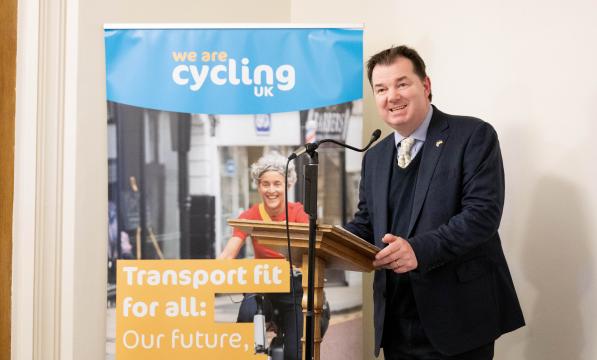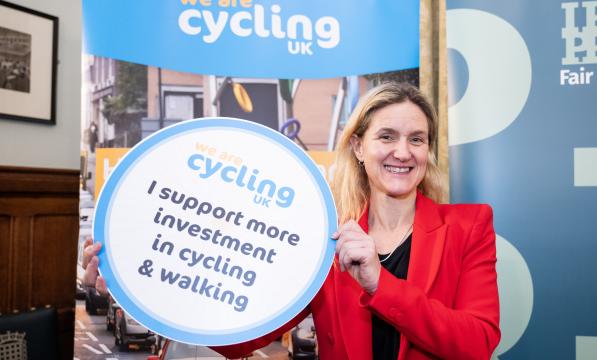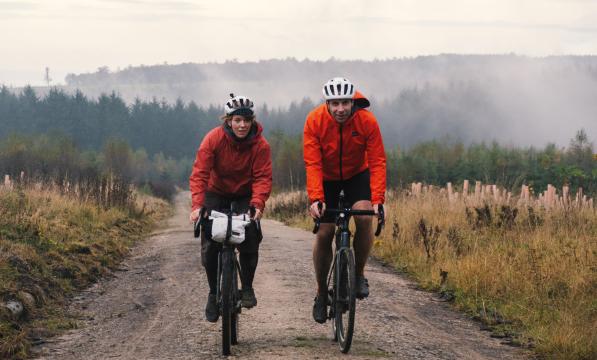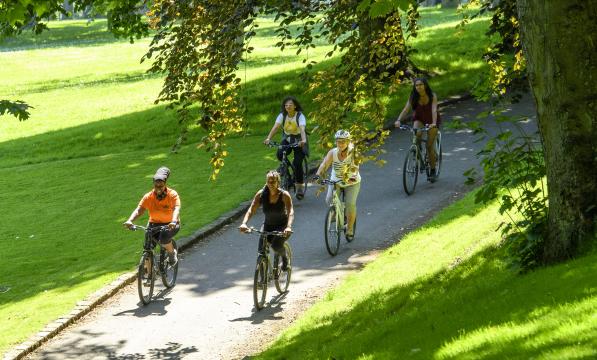Our electoral role: getting cycling on the political agenda in an election year

Towards the end of each year, I’m always asked about Cycling UK’s campaign plans and priorities for the year ahead. My response for 2024 is starting to sound a bit like a Donald Rumsfeld answer.
For the former US Secretary of Defence there were known knowns, known unknowns and unknown unknowns. In the world of cycling policy and campaigning, the 2024 known known is that, legally, there has to be a general election before 28 January 2025. That almost certainly means an election in 2024.
The known unknown is when, and the unknown unknowns include whether Cycling UK and others passionate about the benefits of getting more people cycling will be able to make this relevant to politicians and candidates in an election year.
That’s our big challenge for 2024. Spoiler alert: we’re not going to do that by talking about more people cycling as an end in itself.

To get wider political support, we need to talk about the benefits of more people cycling, and to show how that’s relevant to the cost of living, the environment, public health and other issues that are on the political and public agendas. We need to frame cycling as a solution or, as journalist Peter Walker so eloquently describes it in his book, a miracle pill.
Of course, many decisions relating to cycling, including funding, are taken by devolved governments in Scotland, Wales and Northern Ireland, so some of you might be wondering how relevant a Westminster election is in those nations.
The answer depends on whether you’re looking purely at manifesto commitments or more broadly at the wider political support for cycling and the context in which cycling, active travel, speed limits and transport policies are discussed.
U-turn if you want to…
Back in October at the Conservative Party Conference, the UK government announced its new ‘plan for drivers’, immediately revoking guidance to local authorities that was intended to encourage them to be bold when designing and delivering cycling and walking schemes.
A government that had in the previous three years introduced excellent new design standards for cycling infrastructure, announced a bold ‘Gear Change’ vision to deliver the changes needed to get more people walking and cycling, and increased (though not by enough) investment in active travel, had within a few months done a U-turn.
It cut dedicated active travel funding by over two thirds; railed against its own policy support for low traffic neighbourhoods; questioned the previous political consensus on 20mph limits; and promised to deliver policies to benefit drivers rather than policies to give people transport choices, including cycling and public transport.
Looked at from a narrow perspective, some of these decisions and proposals only affect England, but the wider mood music matters. A by-election in Uxbridge last summer seems to have convinced some in politics that it’s a vote-winning strategy to oppose measures designed to reduce traffic, to lower speed limits or to enable more people to cycle.
That’s had implications beyond England, including the unrelenting and inaccurate criticism of bold measures taken in Wales to introduce a default 20mph speed limit on restricted roads. And, within some news outlets, it’s also fed into a media narrative which is obsessively negative about cycling or those who cycle.
If you live in Scotland, it will be your politicians in Holyrood who can directly influence the level of funding for cycling, not your Westminster MP. But our election work in 2024 isn’t just about the manifesto commitments the political parties make.
It’s about galvanising wider political support and building a more positive narrative around the benefits of cycling. That’s something that matters wherever you live in the UK.
A real gear change?
We will be asking political parties and candidates to support specific cycling demands, and we’ll produce a Cycling UK manifesto which, for England, will include a commitment to significantly increase funding for active travel.
We’ve seen the governments in both Scotland and Wales make commitments to reduce levels of motor traffic, acknowledging that carbon reduction targets, increased congestion and air pollution concerns can’t be fixed by simply building more roads – something that’s been proven time and again not to work. We’ll be pushing for similar measures to reduce motor traffic in England.
We will be putting the case for more active travel investment and less motor traffic in context, focusing on the benefits. Chris Boardman, Active Travel Commissioner for England, has summed that up neatly: “Name any crisis: active travel helps.”
The environmental, health and societal benefits of more people cycling are well established, but the economic case for investing in cycling is often overlooked.

In an election year, where every party is going to be reluctant to make funding commitments, it’s that economic case we particularly need to hammer home. For example, the Department for Transport’s own figures show that investment in active travel yields a return on investment it describes as “very high”, bringing in nearly £6 for every £1 spent.
Crucially, the return on investment comes back much quicker than from investment in other transport infrastructure, which often takes decades to deliver and longer still for the benefits to become reaped. The message to politicians wanting the best bang for their buck has to be that active travel investment reaps rewards – and quickly.
Politicians don’t just want the dry cost-benefit numbers, however. They also want to see the evidence of where this has worked. So campaigners often point to examples – like the Netherlands as a whole and cities elsewhere, such as Copenhagen, Bogota and Seville – where sustained investment in active travel infrastructure has massively increased levels of cycling, with multiple benefits.
We don’t even need to look abroad to see that long-term investment and building more cycle lanes gets more people cycling. We’ve seen this in London.
Cycling levels continue to increase year by year in the capital, up 6.3 % last year and by 20% since before the pandemic as, year by year, the cycling network expands. It grew from 90km in 2016 to 352km last year. Now 24% of Londoners say they cycled last year.
While there are other examples within the UK, London shows that well-built cycling infrastructure is and will be used, and will change travel behaviours over time.

Pedalling politics
I’ve deliberately not gone into much detail about manifesto asks in this article. What really counts is the narrative explaining why these demands matter, and why getting more people cycling helps deliver politicians’ other policy goals.
Yet once Cycling UK’s manifesto is published, expect to see asks around: road safety and changes to our road traffic laws; increased access to the countryside for people cycling and reform of our off-road access laws; and a strengthened planning system, so that new homes and other developments are required to be built around frequent public transport services, safe streets and walking and cycling networks.
Schools, shops, healthcare facilities and green open space can and should be within a short walk or cycle of people’s homes.
Having explained why the general election is going to be a major focus for our campaigning and lobbying in 2024, I should add that we’ve already been busy with this. Much of it has been quiet lobbying and engagement rather than public-facing campaigning, though that will change as we get nearer to the election.
Last September and October, Cycling UK attended several party conferences and put on events at both the Labour and Conservative conferences. Before, during and following those conferences we’ve been engaging with the parties and individual candidates. We will be ramping that up in the coming months.
We’re also working with two separate think tanks on research that should support our manifesto demands. It is due to be published early in 2024 and launched at parliamentary events in Westminster. As we approach the election, we’ll need to engage our supporters and enable you to ask your candidates whether they’ll support our manifesto if elected.
We’ll make that really easy with a simple supporter action, so you can email your candidates. Some people have asked whether these email campaigns work.

The simple answer is yes – but usually not on their own. That’s why, by the time we ask you to write to your candidate, they’ll already have heard from us.
If they’re from one of the major parties, we’ll have already engaged with their party colleagues, and we’ll be highlighting why supporting our manifesto will help tackle a myriad of economic, health and environmental issues. What we can’t do is speak to your candidates as a constituent, which is why we’ll need your support.
Back to Donald Rumsfeld and what we do and don’t know. We know that more people cycling brings huge benefits, but that not all politicians seem to understand that. We also know we need to try to convince them and secure wider political support for cycling. It’s our campaign priority this year.
But the 2024 unknown unknown I started with was whether, in an election year, we’ll be able to make the benefits of getting more people cycling relevant to politicians and candidates. What we do know is that we’ll have more chance of succeeding with your support.
Please keep an eye out for our election 2024 campaigns communications. Help us turn this big unknown into a collective success.
Cycle magazine
Every two months Cycling UK members receive Cycle magazine, filled with interesting and informative articles, news and reviews for all cyclists.
Members can read the magazine in full online; non-members can read selected highlights.







